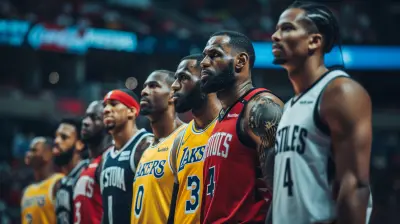16 December 2024
In today's fast-moving world, sports have become more than just entertainment. Sure, we all love the thrill of a last-minute goal or a buzzer-beating shot, but sports have evolved into something much bigger—something that touches lives far beyond the stadiums and arenas. One of the ways this happens? Charity games.
You’ve probably heard of them—those special one-off events where teams or athletes come together to raise funds for a good cause. But have you ever stopped to think about why charity games matter now more than ever? Spoiler alert: They do, and the impact goes way beyond just a feel-good moment.
So, let’s dive deep into this topic and explore why charity games in sports are not just important but absolutely essential in today’s world.

The Rise of Charity in Sports
A Tradition Rooted in Giving Back
Charity and sports have always shared a connection. From local community events to major global initiatives, athletes have long used their platforms to give back. But in recent years, the stakes have grown significantly. Now, athletes aren't just donating a portion of their salary or showing up to a charity auction—they're organizing entire games, often televised, that draw millions of dollars for good causes.Why the shift? Well, a lot of it has to do with the massive influence athletes and sports organizations wield today. With social media and global fanbases, sports figures now have a louder voice and a larger audience than ever before. And with great power comes great responsibility, right? These athletes are stepping up to the plate (pun intended) and using their platforms to create positive change.
The Global Stage of Sports
Sports are a universal language. No matter where you’re from, you likely have a sport that resonates with you. This global appeal makes charity games incredibly powerful. A match played in London can raise awareness for an issue in Africa, thanks to the worldwide reach of sports media. That’s the kind of influence we’re talking about here.Charity games leverage this global stage to bring attention to causes that might otherwise go unnoticed. Whether it's raising money for disaster relief, supporting medical research, or helping underprivileged communities, the reach and visibility of these events are unparalleled.

The Emotional Impact of Charity Games
Bringing People Together for a Common Cause
Ever notice how sports can break down barriers? Whether you’re watching from your couch at home or in a packed stadium, sports have this magical way of uniting people. Charity games take that unity a step further. Instead of just cheering for a team, fans get the chance to rally around a cause. It’s not just about the score anymore; it’s about helping others while enjoying the game.The beauty of charity games lies in the emotional connection they foster. Fans aren’t just passive observers—they feel like they’re part of something bigger, something meaningful. And that sense of purpose? It sticks with them long after the final whistle blows.
Athletes as Role Models
Let's be honest: athletes are more than just players on a field—they’re role models. When athletes participate in charity games, they send a powerful message to their fans. They show that giving back is cool, that helping others is something to be proud of. And when young fans see their sports heroes making a difference, it inspires them to do the same.Take LeBron James, for example. He’s not just dominating on the basketball court; he’s actively involved in charitable efforts, including his own foundation focused on education. Through charity games and community initiatives, athletes like LeBron are reshaping what it means to be a sports star.

The Financial Power of Charity Games
Raising Millions for Good Causes
Alright, let’s talk numbers. Charity games aren't just about raising awareness (though that’s super important). They also raise serious cash for causes that need it. Whether it's through ticket sales, sponsorship deals, or merchandise, these games have the potential to generate millions of dollars in donations.Take the annual NBA All-Star Celebrity Game, for instance. While it might seem like just a fun event where celebrities and athletes mix it up on the court, the game raises significant funds for various charitable organizations. These aren’t just token donations; we’re talking life-changing amounts of money.
Corporate Sponsorship and Partnerships
Corporations have started to take notice of the growing influence of charity games, and they want in. Sponsoring a charity game can be a win-win for companies. Not only do they get exposure to a wide audience, but they also get to align themselves with a good cause. And let’s face it, in today’s world, consumers want to support companies that give back.This influx of corporate sponsorship is a huge boost for charity games. It allows these events to scale up, reach more people, and ultimately raise more money for the causes they support. It’s a cycle of positive reinforcement that benefits everyone involved.

Charity Games and Social Media: A Perfect Match
Amplifying the Message
Remember when I said athletes have a larger platform than ever before? Social media is a big part of that. Charity games, when combined with the power of social media, can spread like wildfire. A single tweet from a superstar athlete can result in thousands of retweets, shares, and likes, instantly amplifying the reach of the cause.Platforms like Instagram, Twitter, and TikTok allow athletes and teams to engage directly with their fans, encouraging them to donate, participate, or simply spread the word. The beauty of it is that this interaction is genuine. Fans feel like they’re part of the movement, and that sense of involvement can lead to real change.
Viral Challenges and Online Campaigns
Another way charity games are leveraging social media is through viral challenges and online campaigns. Remember the Ice Bucket Challenge? That initiative raised over $115 million for ALS research, and it all started with a few social media posts. Charity games have started incorporating similar tactics, challenging fans to donate, share, or participate in some way.These viral moments create a ripple effect, where one person’s contribution or share leads to another, and another, and another. The result? Massive awareness and funds raised for important causes.
Charity Games as a Catalyst for Change
Tackling Social Issues
Charity games are increasingly being used as platforms to tackle social issues head-on. From racism to gender inequality, these games provide a stage for important conversations. In recent years, we've seen charity games dedicated to promoting mental health awareness, LGBTQ+ rights, and more.By aligning with these causes, athletes and sports organizations are using their influence to drive change. And here's the thing—sports fans listen. When their favorite team or player speaks out on an issue, it resonates. Charity games give these messages a megaphone, allowing them to reach a global audience in a way that few other platforms can.
Inspiring the Next Generation
One of the most significant impacts of charity games is the inspiration they provide to younger generations. When kids see their favorite athletes taking time out of their busy schedules to support a good cause, it plants a seed. It teaches them that success isn’t just about winning—it’s about what you do with that success.Charity games help to cultivate a culture of giving back among young fans. Whether it's through donating, volunteering, or simply being more aware of the issues around them, these kids are learning that they, too, can make a difference.
The Future of Charity Games in Sports
A Growing Trend
If the last few years are any indication, charity games are only going to get bigger. With the increasing importance of social responsibility in today’s world, more and more athletes, teams, and organizations are realizing the power they have to create change. And charity games are one of the most effective ways to do that.We’re already seeing charity games become annual events for some sports leagues, with bigger and better production values, more fan engagement, and larger sums of money raised. As technology continues to evolve, we can expect charity games to become even more interactive, with fans playing an even more active role in supporting their favorite causes.











Hadley Wagner
Charity games serve as vital platforms for athletes to leverage their influence, fostering community engagement and support. They highlight the social responsibility of sports, uniting fans for meaningful causes beyond competition.
March 27, 2025 at 9:39 PM